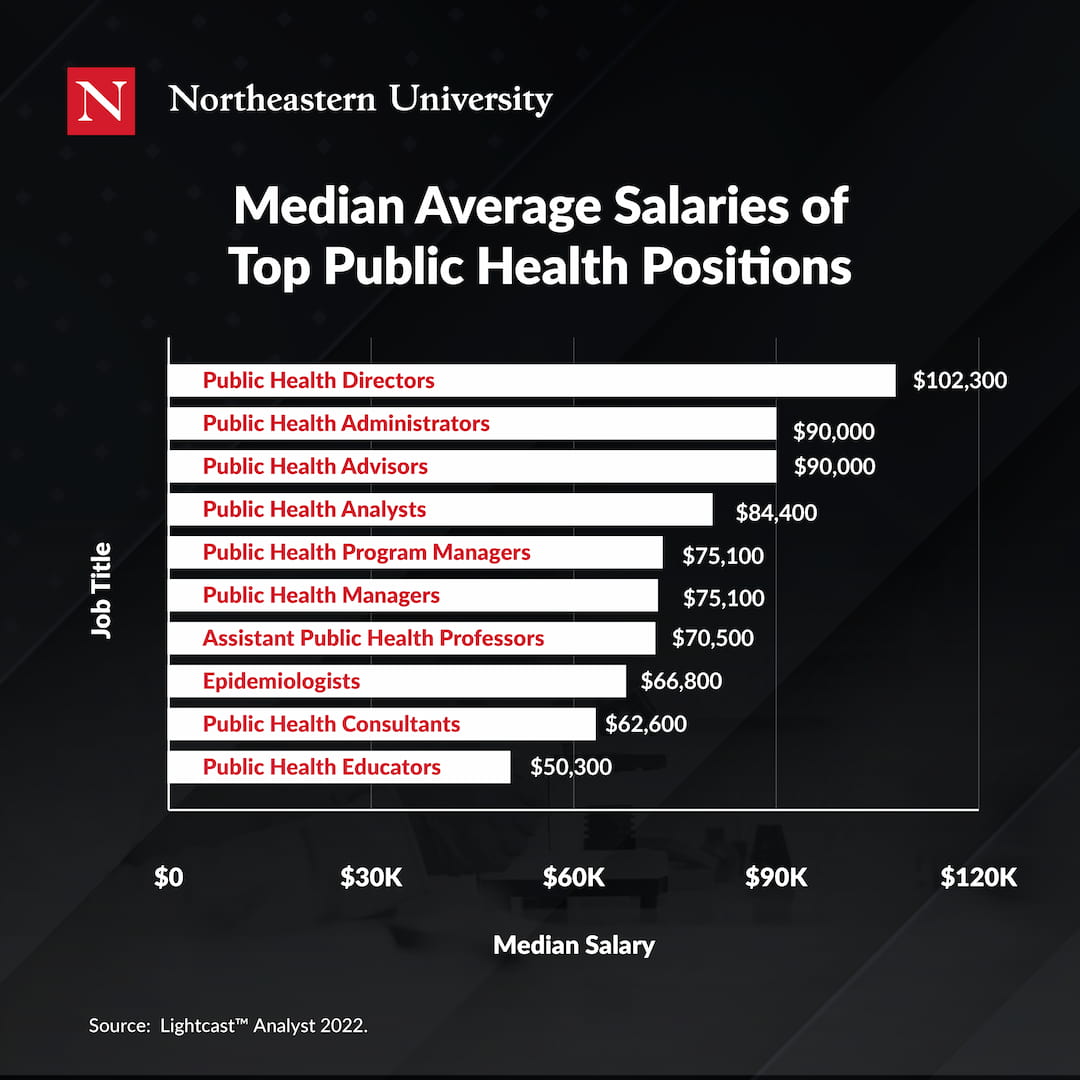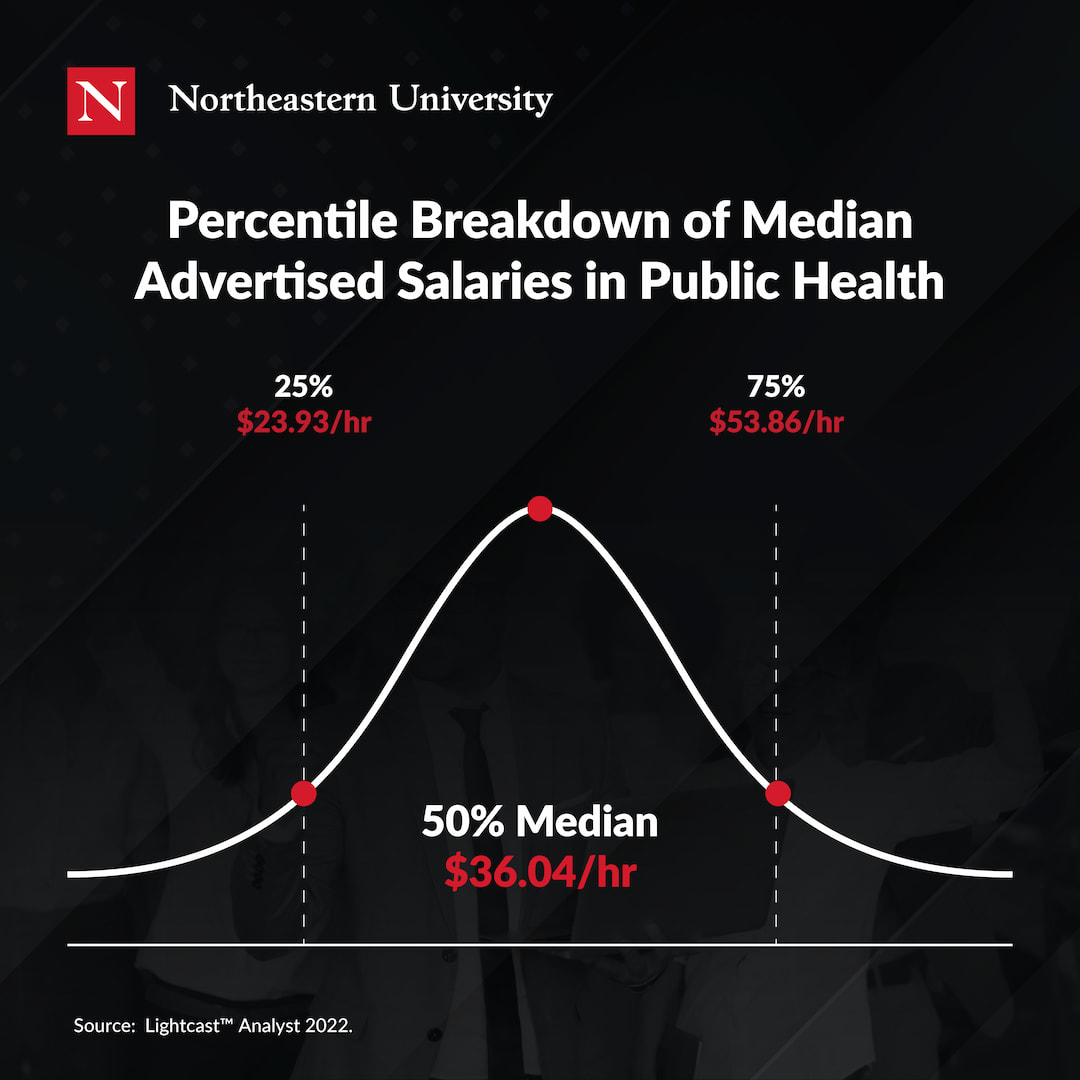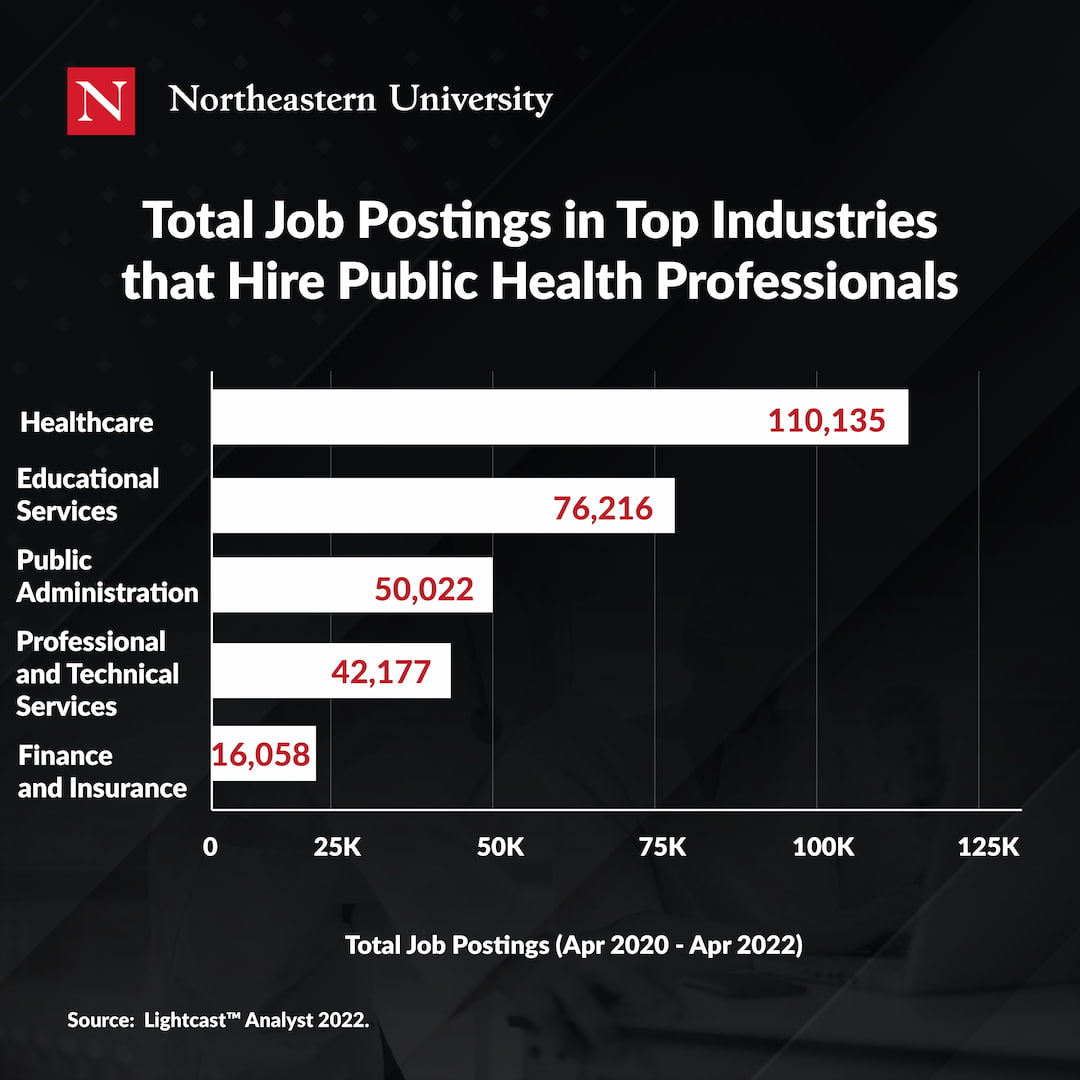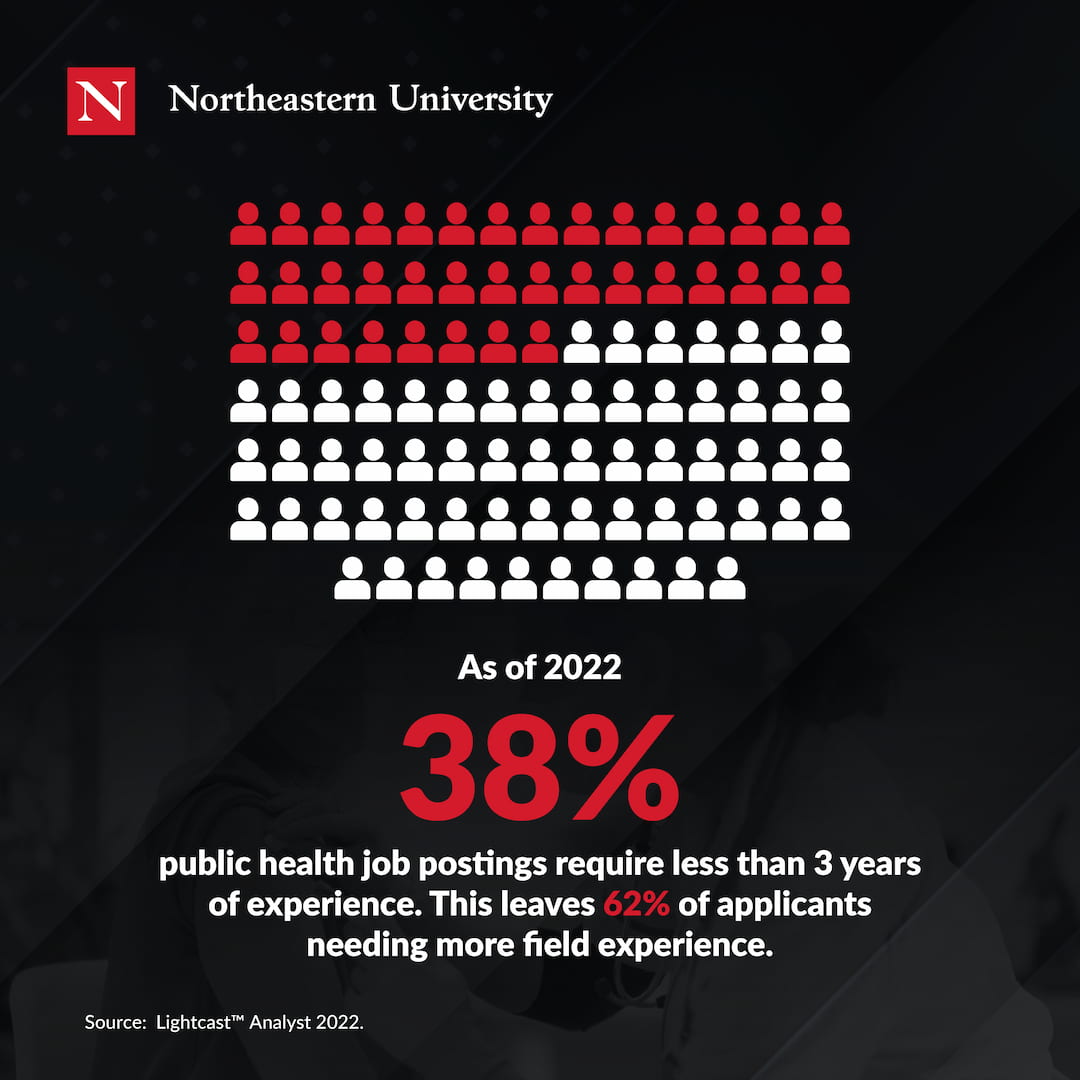Many recent graduates are feeling the growing pressures of employment. According to a survey by Monster, around 66 percent of college graduates are skeptical about gaining employment immediately after graduation.
Aspiring healthcare professionals have similar fears, wanting a fulfilling career that provides stability and growth while also offering opportunities to make an impact. Public health is a thriving field that can offer job seekers both growth and financially rewarding opportunities.
Whether you are a prospective public health professional or a career changer who wants to break into this exciting field, it’s important to understand the top job titles with the highest earning potential.
Why Pursue a Career in Public Health?
Public health is a diverse sector that has an extensive impact on the health of global communities. From clinical care to administrative roles, individuals who work in the public health industry explore pressing and challenging community health issues in positive and meaningful ways.
Public health workers care for the health and well-being of individuals in their local communities, institute programs and policies that encourage healthy lifestyles, and respond to public health issues and diseases. With a variety of positions and areas of focus within the field, prospective public health professionals have various career opportunities.
“We’re seeing a lot of growth in public health technology, public mental health, and environmental health,” says Emily Grilli-Scott, assistant program director of the Master of Public Health (MPH) program at Northeastern University’s Bouvé College of Health Sciences.
While public health is a wide net to cast in the job market, it’s still important to understand your options and what they can offer you. For example, some job seekers might be motivated to find careers with higher earning potential to ensure financial stability. Luckily, there are numerous high-earning options available to prospective public health professionals.
The Highest Paying Careers in Public Health
Here’s a list of high-paying public health jobs that can provide long-term financial security.

1. Public Health Director
Median Annual Salary: $102,300
Public health directors are responsible for the overall organization of public health organizations and programs. These leadership positions don’t work one-on-one with patients, but rather organize, plan, and manage the programs responsible for improving the health of individuals, counties, and states.
2. Public Health Administrators
Median Annual Salary: $90,000
Public health administrators are nonclinical leaders and organizers who manage community-wide health programs or organizations to ensure they operate efficiently and effectively. These individuals work to ensure improved welfare and awareness/knowledge for their communities.
3. Public Health Advisors
Median Annual Salary: $90,000
Public health advisors (PHAs) offer assistance and guidance to public organizations, nonprofits, and private agencies to improve public health. They also help inform and educate communities on public health information and initiatives that affect them.
4. Public Health Analysts
Median Annual Salary: $84,400
Public health analysts work to identify critical health needs for communities. They collect and interpret data to identify and provide solutions for public health issues, such as disease, addiction, violence, and environmental hazards. They frequently work with community members, policymakers, service providers, and community groups to identify ways health policies and programs can better address a community’s needs.
5. Public Health Program Managers
Median Annual Salary: $75,100
Public health program managers work with clinicians and other public health workers to efficiently organize and manage new public health projects for various organizations and facilities. While the job title of “program manager” is a broad term in the public health field, they often work to improve and enhance existing public health programs and initiatives to ensure better quality care for the communities they serve.
6. Public Health Managers
Median Annual Salary: $75,100
Public health managers work within hospitals and healthcare facilities to plan and oversee services to ensure compliance with current healthcare laws and regulations. They may focus on a particular department or oversee the entire organization, helping to train staff and set goals and expectations to ensure success and quality care.
7. Assistant Public Health Professors
Median Annual Salary: $70,500
Assistant public health professors work closely with professors by assisting them with responsibilities such as delivering lectures, creating and designing course plans and lessons, and grading assignments. These individuals may also participate in research related to their area of focus.
8. Epidemiologists
Median Annual Salary: $66,800
Epidemiologists are critical in today’s global health climate. Often called disease detectives, these individuals identify causes for diseases and determine how to control, stop, and prevent them from spreading both locally and worldwide. They also work to identify new illnesses or viruses to create preventative measures to keep them from spreading in the future.
9. Public Health Consultants
Median Annual Salary: $62,600
Public health consultants are highly trained individuals employed by government agencies, healthcare organizations, nonprofit organizations, and businesses. They are tasked with creating and promoting policies and programs that improve the overall health outcomes within their communities.
10. Public Health Educators
Median Annual Salary: $50,300
Public health educators are research-oriented rather than administrative and focus on helping the overall health of communities by developing educational campaigns and programs to promote healthy habits and environments. These individuals focus on analyzing data to create and improve health programs for broad populations or communities.
What Determines Your Salary Potential?
Many factors can determine your earning potential in a public health career.

Earning the Right Degree
While most high-paying careers have entry-level positions available to job seekers with a bachelor’s degree, the critical nature of these roles often requires extensive public health experience and education.
“Bachelor’s degrees in public health, while some exist, are very similar to a bachelor’s degree in health science,” explains Grilli-Scott. “You’ll have some public health knowledge [with a bachelor’s], but really a master of public health (MPH) is the degree that you need to be the most competitive and effective in leading in those spaces.”
An MPH specifically trains students to gather and analyze public data, identify and investigate public health challenges, and work across disciplines to improve health outcomes for entire communities across the globe. Most master of public health (MPH) programs at institutions like Northeastern University are offered in on-site, virtual, and hybrid formats that can be completed in as little as two years.
Applying to a High-Paying Industry
Because the world of public health is so vast and dynamic, earning potential is often determined by the industry in which you work. “Industries are important when we look at highest-paying positions. I feel like it really depends on the field, because public health is so interdisciplinary,” says Grilli-Scott. For example, industries driven by technology or data are in exceptionally high demand right now and often carry a higher earning potential than other fields.

Getting Experience
As with any industry, employers value candidates with field experience. According to Lightcast data, only 38 percent of job postings require less than three years of experience. This indicates the real value background experience lends to a resumé or job application.

Fortunately, hands-on experience in the form of internships and community work is baked into many MPH programs and can give candidates an edge over their competition. “Any experience in local public health is really important to break into the field,” Grilli-Scott says. “Because wherever you are geographically, local public health can be different.”
Even though experience is highly valued in today’s job market, applicants must ensure their experience communicates the type of work they are interested in and the communities they want to help in the future. Be sure to find a master’s program that offers numerous experiential opportunities to ensure your resume reflects your career aspirations and interests.
Work Toward a Lucrative Career in Public Health
The Master of Public Health (MPH) program at Northeastern University combines research, service-learning, and experiential, hands-on training in an online or in-person setting to ensure graduates are skilled health professionals. Since an MPH program prepares students to address a broad range of public health issues and professions, job candidates with this degree offer a wealth of knowledge to employers who want to tackle the health issues facing both local and global communities.
For those interested in earning a degree at a much faster pace, consider an accelerated program like Northeastern’s Master of Public Health / 1-Year Experiential. The experience-based program is delivered 100 percent online and challenges students with an intensive 12-month course load. While accelerated, this program is accredited by the Council for Education on Public Health (CEPH) and the Association of Schools and Programs of Public Health (ASPPH).
Learn more about the Master of Public Health / 1-Year Experiential program at Northeastern and take the first step toward a lucrative career in public health.






Related Articles
Jackney Prioly Joseph on How Her MPA Helped Her Career
Master’s in Nonprofit Management vs. Public Administration
How an MPH Clarified One Alumna’s Career Path